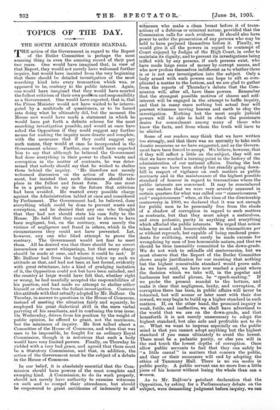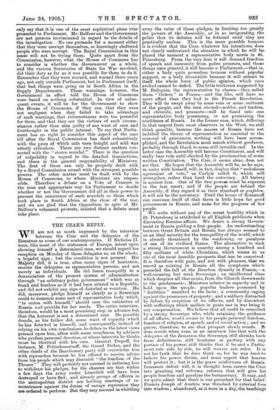TOPICS OF THE DAY.
THE action of the Government in regard to the Report of the Butler Committee is perhaps the most amazing thing in even the amazing record of their past two years. One would have imagined that, in view of that Report, they would not merely have welcomed further inquiry, but would have insisted from the very beginning that there should be detailed investigation of the most searching kind into every transaction which was, or appeared to be, contrary to the public interest. Again, one would have imagined that they would have courted the fullest criticism of their own position and responsibility as a Government. One would have expected, that is, that the Prime Minister would not have waited to be interro- gated by a multitude of questioners, or to be forced into doing what he ultimately did, but the moment the House met would have made a statement in which he would' have put forth a definite scheme for the most searching investigation possible, and would at once have asked the Opposition if they could suggest any further means for making the inquiry more drastic and complete, with the assurance that if they could suggest any such means, they would at once be incorporated in the Government scheme. Further, one would have expected him to say that although he believed the Government had done everything in their power to check waste and corruption in the matter of contracts, he was deter- mined that nobody should say that he wished to shelter them behind the inquiry. He therefore not merely welcomed discussion on the action of the Govern- ment, but insisted that such discussion should take place in the fullest and freest form. No one must be in a position to say in the future that criticism had been avoided. He wanted every possible charge against the Administration tabled at once and considered by Parliament. The Government had, he believed, done everything which could be done to prevent waste and corruption, and he desired that any one who thought that they had not should state his case fully to the House. He held that they could not be shown to have been negligent, but, on the contrary, were merely the victims of negligence and fraud in others, which in the circumstances they could not have prevented. Let, however, any one who liked attempt to prove the contrary. The Government would not fear to meet them. All he desired was that there should be no covert innuendoes or secret whisperings, but that every charge should be made at once, and where it could be met.' If Mr. Balfour had from the beginning taken up such an attitude as that, and had not been at last forced, evidently with great reluctance, into a kind of grudging imitation of it, the Opposition could not but have been satisfied, and the country at large would have felt that, whether right or wrong, he had manfully accepted the responsibilities of his position, and had made no attempt to shelter either himself or others from the fullest investigation. Contrast this attitude with that actually adopted by Mr. Balfour. On Tuesday, in answer to questions in the House of Commons, instead of meeting the situation fairly and squarely, he employed his great dialectical skill in the mere verbal parrying of his assailants, and in confusing the true issue. On Wednesday, driven from his position by the weight of public opinion, he offered to grant, not the maximum, but the minimum of inquiry. He first talked about a Committee of the House of Commons, and when that was seen to be impossible, he fought for an ordinary Royal Commission, though it is notorious that such a body would have very limited powers. Finally, on Thursday he yielded with a very bad grace, and agreed that there must be a Statutory Commission, and that, in addition, the action of the Government must be the subject of a debate in the House of Commons.
In our belief, it is absolutely essential that the Core- Mission should 6ve powers of the most complete and sweeping kind. A Commission, to do its work properly, should not merely have authority to examine. witnesses on oath and to compel their attendance, but should be empo7ered to grant certificates of indemnity to all witnesses who make a clean breast before it of trans- actions of a dubious or criminal nature, provided that the Commission calls for such evidence. It should also have power to order the prosecution of any persons who may be, held to have perjured themselves before it. Finally, wo would give it all the powers in regard to contempt Of Court enjoyed by Judges of the High Court, in order to maintain its dignity, and to prevent its investigations being trifled with by any persons, if such persons exist, who have made large sums of money by corrupt means, and who now profess themselves indifferent as to whether there is or is not any investigation into the subject. Only a body armed with such powers can hope to sift so com- plicated a matter to the bottom, and we are glad to gather from the reports of Thursday's debate that the Com- mission will, after all, have these powers. Remember that the strongest possible motives of shame and self- interest will be engaged in the attempt to baffle inquiry, and that in many cases nothing but actual fear will prevent witnesses moving heaven and earth to clog the investigation. Nothing but the most ample judicial powers will be able to hold in check the passionate desire for concealment among many of those who know the facts, and from whom the truth will have to be elicited.
Some of our readers may think that we have written too strongly, and that there was no necessity to take such drastic measures as we have suggested, and as the Govern- ment have been forced to accept. We believe, however, that if they will reflect a little on the subject, they will see that we have reached a turning-point in the history of the administration of our national affairs. During the last ten years we have been slowly but steadily going down- hill in respect of vigilance on such matters as public contracts and in the maintenance of the highest possible standard of honour in regard to transactions where the public interests are concerned. It may be remembered by our readers that we were very severely censured in certain quarters for what was called our " censoriousness " and " suspiciousness " when, at the time of the directorship controversy in 1900, we declared that it was not enough for public men to be personally free from the shade of a shadow of corruption in regard to such matters as contracts, but that they must adopt a meticulous, and even pedantic, purity in anything and everything which affected the public interests. We urged that action taken by sound and honourable men in transactions per se without reproach, but capable of being rendered prece- dents for evildoing, would surely be made excuses for wrongdoing by men of less honourable nature, and that we should be thus insensibly committed to the down-grade. We do not wish to rekindle old controversies, but we must observe that the Report of the Butler Committee shows ample justification for our insisting that nothing but the highest conceivable standard would prove safe. As we have said, we have now reached a point where the decision which we take will, in the popular and barbarous but useful phrase, be " epoch-making." If we probe the present scandal to the bottom, and make it clear that negligence, laxity, and corruption, if corruption there has been, in public affairs will never be tolerated, but will sooner or later meet with their due reward, we may begin to build up a higher standard in such matters. If, on the other hand, the promised inquiry is weak, futile, and ineffective, we shall have advertised to the world that we are on the down-grade, and that henceforth it is not merely unnecessary to adopt the highest standard, but also safe and profitable not to do so. What we want to impress especially on the public mind is that you 'cannot adopt anything but the highest standard if you mean ultimately to avoid the lowest. There must be a pedantic purity, or else you will in the end touch the lowest depths of corruption. Once allow public servants to feel that they can safely. be " a little casual " in matters that concern the public, and they or their successors will end by adopting the ethics, of Tammany Hall. There is no via media in public purity. A public servant can no more lose a little piece of his honour without losing the whole than can a woman.
As to Mr. Balfour's petulant declaration that the Opposition, by asking for a Parliamentary debate on the subject, were demanding judgment before inquiry, we can only say that it is one of the most sophistical pleas ever presented to Parliament. Mr. Balfour and the Government are not persons incriminated in regard to the details of the investigation. No one pretends for a moment either that they were corrupt themselves, or knowingly sheltered people who were corrupt. The Royal Commission in this sense will not be trying them. Quite apart from the Commission, however, what the House of Commons has to consider is whether the Government as a whole, and the various Secretaries of State for War involved, did their duty as far as it was possible for them to do it. Remember that they were warned, and warned three years ago, not only outside Parliament, but in Parliament itself, that bad things were going on in South Africa in the Supply Departments. These warnings, however, the Government in effect told the House of Commons were based on nothing substantial. In view of subse- quent events, it will be for the Government to show the House of Commons, if they can, that they were not negligent when they failed to take advantage of such warnings, that circumstances were too powerful for them, and that they are the victims of such circum- stances rather than men guilty of any want of care and forethought in the public interest. To say that Parlia- ment has no right to consider this aspect of the case till after the Royal Commission has dealt exhaustively with the price at which oats were bought and sold was utterly ridiculous. There are two distinct matters con- nected with the " stores scandal." There is the question of culpability in regard to the detailed transactions, and there is the general responsibility of Ministers. The first of these can only be properly dealt with by a Royal Commission armed with the strongest possible powers. The other matter must be dealt with by the House of Commons, to whom Ministers are respon- sible. Therefore a debate on a Vote of Censure is the true and appropriate way for Parliament to decide whether or not the Government did all in their power to prevent the occurrence of such scandals as those which took place in South Africa at the close of the war, and we are glad that the Opposition, in spite of Mr. Balfour's vehement protests, insisted that a debate must take place.



















































 Previous page
Previous page